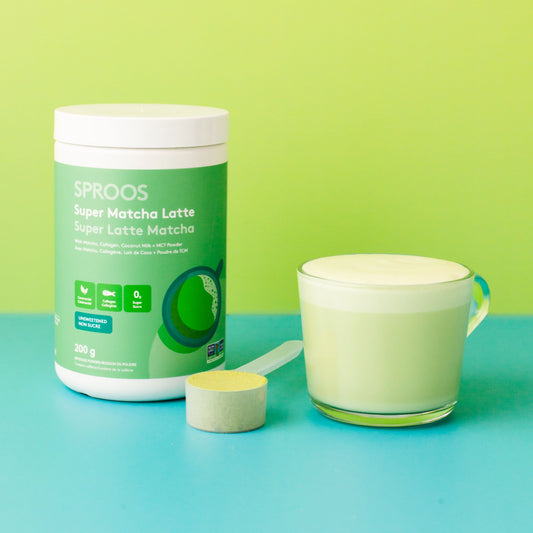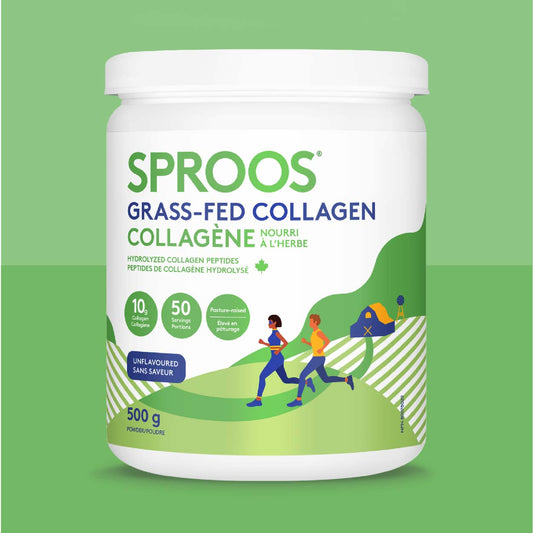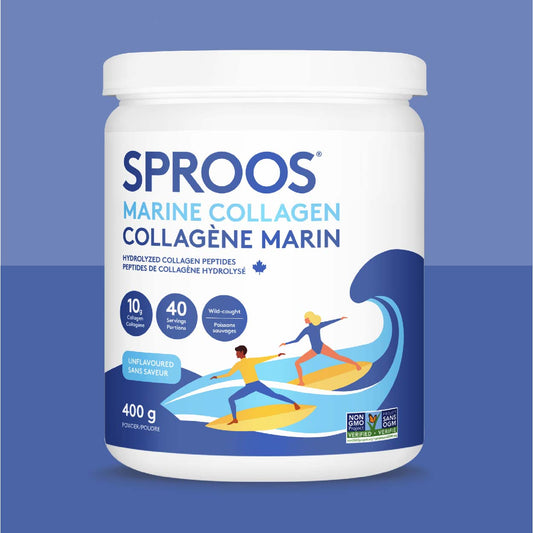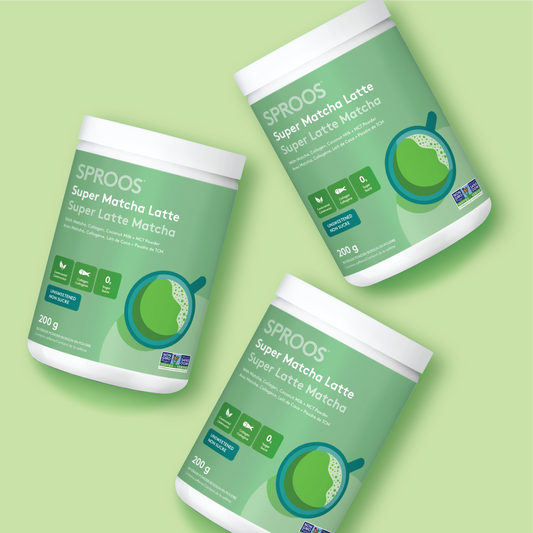La glycine est un acide aminé non essentiel.
Bien que qualifier la glycine d'acide aminé non essentiel puisse la faire paraître moins importante, c'est tout le contraire. Non essentiel signifie que notre corps est capable de la produire. Cependant, nous consommons également de la glycine par notre alimentation. On la trouve dans des aliments tels que les viandes, la dinde, le poulet, le poisson (comme le saumon), les graines, les arachides, les produits à base de soja et les pois. La glycine se trouve aussi dans – vous l'avez deviné – le collagène.La glycine est un composant majeur du collagène.
Quoi ? Oui, la glycine se trouve dans le collagène. Si vous vous souvenez de notre leçon Collagène 101 sur notre page Science, le collagène est une grosse protéine. Cette grosse protéine est composée de longues chaînes d'acides aminés liés. L'un des acides aminés présents dans le collagène : la glycine.Quel rôle joue la glycine dans notre corps ?
La glycine joue divers rôles importants dans notre corps. Sans glycine, notre corps aurait du mal à accomplir les fonctions quotidiennes. Elle nous aide à maintenir et améliorer notre santé et soutient notre croissance. Des études ont montré que la glycine peut non seulement aider à maintenir la santé et le bien-être, mais aussi aider à prévenir différentes maladies. Certaines maladies incluent les maladies cardiovasculaires, les maladies inflammatoires, l'obésité, le cancer et le diabète. De plus, la glycine peut aider au sommeil et au fonctionnement cérébral. Voici quelques-uns des bénéfices et fonctions les plus étudiés de cet acide aminé.1. Activité antioxydante
La glycine a la capacité de agir comme un antioxydant et de diminuer l'inflammation dans le corps. Les espèces réactives de l'oxygène (ROS) sont des molécules qui s'accumulent dans le corps et peuvent causer des dommages. Cependant, des études ont montré que la glycine possède plusieurs méthodes pour diminuer l'activité des ROS dans le corps. De plus, la glycine a aussi des effets anti-inflammatoires. Elle agit en inhibant les molécules pro-inflammatoires (ou qui favorisent l'inflammation) dans le corps. Les mécanismes sont compliqués, mais croyez-nous, la science est là pour le prouver.2. Protection contre la toxicité hépatique
La science montre que la glycine pourrait aider à protéger le foie contre la toxicité induite par l'alcool (appelée aussi hépatotoxicité – un grand mot, nous savons). La consommation chronique d'alcool peut entraîner des niveaux élevés d'acides gras dans le foie, ce qui peut causer une stéatose hépatique. Cependant, la glycine peut aider à réduire cela. Cet acide aminé possède également une forte activité antioxydante et peut donc aider à combattre les dommages oxydatifs causés par l'alcool au foie.3. Amélioration de la qualité du sommeil
La glycine est un neurotransmetteur inhibiteur qui joue un rôle dans notre système nerveux. Qu'est-ce que cela signifie ? Eh bien, notre système nerveux est responsable de l'envoi de signaux de notre cerveau vers le reste du corps. Ces signaux peuvent être excitateurs (stimulant ou favorisant une action) ou inhibiteurs (empêchant une action).
Lorsque nous commençons à avoir sommeil, il y a une augmentation des signaux inhibiteurs car notre corps veut entrer dans un état de relaxation. La glycine contribue à cela en aidant notre corps à savoir qu'il est temps d'aller dormir. En fait, des études ont montré que ceux qui prennent de la glycine avant de se coucher rapportent en réalité un meilleur sommeil et trouvent plus facile de s'endormir la nuit !
4. Peut aider avec le syndrome métabolique
L'obésité est un problème croissant de santé publique. Ce syndrome métabolique peut augmenter le risque de diabète de type II et de maladies cardiovasculaires. Fait intéressant, des résultats montrent que les personnes atteintes du syndrome métabolique (notamment l'obésité et le diabète de type II) ont des niveaux plus faibles de glycine.
Il a été constaté que la glycine diminue les concentrations élevées d'acides gras dans le corps. Elle peut aussi aider à augmenter la sensibilité à l'insuline, ce qui est un problème pour les personnes atteintes de diabète de type II. Elle peut également diminuer l'inflammation dans tout le corps. En raison de ces résultats, les scientifiques suggèrent que la supplémentation en glycine alimentaire pourrait réellement aider les personnes atteintes du syndrome métabolique.
Pourquoi la glycine est-elle importante ? En résumé.
En plus d'être présente dans le collagène, la glycine joue de nombreux rôles importants dans tout le corps. Elle peut aider à se défendre contre diverses maladies et blessures. Elle aide aussi à maintenir les fonctions corporelles normales car elle est très importante dans de nombreux processus quotidiens que notre corps doit accomplir pour survivre. Psst ! Vous cherchez un moyen d'augmenter votre apport en glycine ? Essayez quelques-uns de nos poudres de collagène !Sources
- Razak, M. A., Begum, P. S., Viswanath, B., & Rajagopal, S. (2017). Effet bénéfique multiple de l'acide aminé non essentiel, la glycine : une revue. Oxidative Medicine and Cellular Longevity, 2017, 1716701.
- Wang, W., Wu, Z., Dai, Z., Yang, Y., Wang, J., & Wu, G. (2013). Métabolisme de la glycine chez les animaux et les humains : implications pour la nutrition et la santé. Amino Acids, 45(3), 463–477.
- Zhong, Z., Wheeler, M. D., Li, X., Froh, M., Schemmer, P., Yin, M., Bunzendaul, H., Bradford, B., & Lemasters, J. J. (2003). L-Glycine : un nouvel agent anti-inflammatoire, immunomodulateur et cytoprotecteur. Current Opinion in Clinical Nutrition & Metabolic Care, 6(2), 229–240.
Allison Gonzalez
Spécialiste marketing chez Sproos
Allison a récemment obtenu une maîtrise en sciences de la santé humaine et des sciences nutritionnelles à l'Université de Guelph. Elle est passionnée par tout ce qui touche à la santé et au bien-être, et aime enseigner aux autres l'impact que la nourriture et la nutrition ont sur la vie quotidienne. Pendant son temps libre, elle adore faire de longues courses, prendre un café avec des amis et passer du temps à la plage (quand il ne fait pas froid dehors !).















